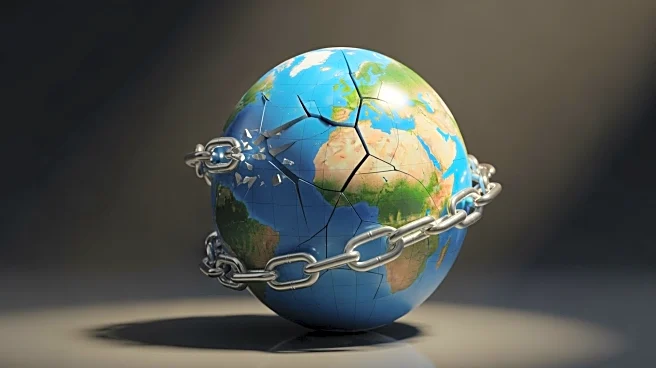What's Happening?
Iran has announced it is no longer bound by the restrictions of the 2015 nuclear deal, known as the Joint Comprehensive Plan of Action (JCPOA). This decision follows stalled negotiations with Western powers to revive the agreement, which was initially
terminated when President Trump withdrew the United States in 2018. Iran's Foreign Ministry stated that all provisions of the deal, including restrictions on its nuclear program, are considered terminated. The JCPOA had imposed significant limitations on Iran's nuclear activities in exchange for sanctions relief. The agreement officially expired on Saturday, ten years after its adoption by the UN Security Council.
Why It's Important?
The termination of Iran's compliance with the nuclear deal raises concerns about the potential escalation of nuclear activities in the region. This development could impact global security and diplomatic relations, particularly with Western countries that have been involved in negotiations. The reinstatement of international sanctions by Britain, France, and Germany further complicates the situation, potentially affecting Iran's economy and international trade. The decision may also influence regional stability, as Iran's nuclear capabilities have been a point of contention among neighboring countries and global powers.
What's Next?
European powers have announced plans to resume discussions aimed at finding a comprehensive, durable, and verifiable agreement. However, Iran's Foreign Minister Abbas Araghchi has expressed reluctance to negotiate, citing the automatic reimposition of sanctions as a deterrent. The international community will likely monitor Iran's nuclear activities closely, and further diplomatic efforts may be necessary to address the situation. The potential for increased tensions in the Middle East remains, as stakeholders assess the implications of Iran's decision.
Beyond the Headlines
The cessation of Iran's compliance with the nuclear deal highlights broader geopolitical dynamics, including the influence of major powers like the United States and Israel on regional security. The situation underscores the challenges of achieving lasting diplomatic solutions in complex international agreements. Ethical considerations regarding nuclear proliferation and the balance between national sovereignty and global security are also relevant in this context.















